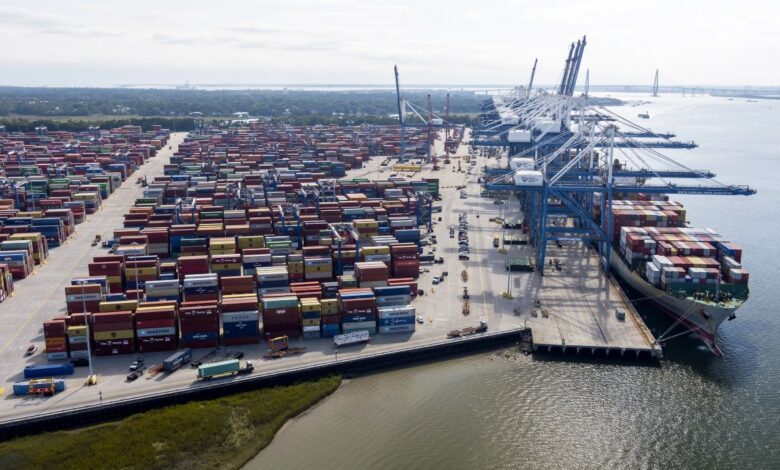
Employers at East and Gulf Coast ports on Thursday filed an unfair labor practice complaint against the dockworkers’ union, accusing them of refusing to negotiate ahead of a threatened strike on Oct. 1.
The U.S. Maritime Alliance (USMX) said it filed the complaint against the union with the National Labor Relations Board (NLRB) over what it said was the union leadership’s refusal to return to the bargaining table. If the group’s request is granted, the union would be required to return to negotiations.
The International Longshoremen’s Association (ILA) and its 45,000 members are preparing for a potential strike that would impact 36 ports on the East and Gulf Coasts that collectively handle more than half of U.S. seaborne trade. Its current six-year contract expires on Monday, Sept. 30, raising the prospect of a strike beginning Tuesday.
“USMX has been clear that we value the work of the ILA and have great respect for its members,” USMX said in a statement announcing the filing of the NLRB charge. “We have a shared history of working together and are committed to bargaining.”
THE TAFT-HARTLEY ACT: WHY BIDEN COULD USE THIS LABOR LAW TO PREEMPT A PORT STRIKE
“Due to the ILA’s repeated refusal to come to the table and bargain on a new Master Contract, USMX filed an Unfair Labor Practice (ULP) charge with the National Labor Relations Board (NLRB) and requested immediate injunctive relief – requiring the Union to resume bargaining – so that we can negotiate a deal,” USMX added.
The ILA slammed USMX’s unfair labor practice filing as a “publicity stunt” and countered that the group should’ve filed such a charge against its own members for failing to adequately compensate ILA’s workers.
“USMX filing these charges four days before the expiration of the current Master Contract clearly illustrates what poor negotiating partners they have been,” the ILA said in a statement. “If it wasn’t for the ILA engaging in serious and productive negotiations, most of the local agreements would not have been settled over the past year.”
WHAT PRODUCTS WOULD BE DISRUPTED BY A PORT STRIKE?
A potential port strike affecting East and Gulf Coast ports would cost the U.S. economy an estimated $5 billion per day, according to a J.P. Morgan analysis.
If a strike occurs, import and export shipments of a variety of products would be impacted.
The ports that would be affected by the strike handled $37.8 billion in vehicle imports in the 12-month period through the end of June 2024, according to S&P Global Market Intelligence.
US ECONOMIC TOLL OF EAST COAST AND GULF PORT STRIKE COULD BE BILLIONS PER DAY, TRADE EXPERT WARNS
The Port of Baltimore leads the nation in car shipments, while auto parts are also major imports at other ports on the East Coast and Gulf of Mexico. Those ports also lead the U.S. in shipments of machinery, fabricated steel and precision instruments, according to S&P Global Market Intelligence data.
Agricultural products are also a significant import, as three-quarters of U.S. banana imports are from countries like Guatemala and Ecuador, Jason Miller, interim chair of Michigan State University’s department of supply chains, told Reuters.
There would also be an impact on the $18.5 billion U.S. beef and pork export industry and the $5.8 billion poultry and egg export sector that is shipped in refrigerated containers.
GET FOX BUSINESS ON THE GO BY CLICKING HERE
In the pharmaceutical industry, over 91% of containerized imports and 69% of containerized exports of U.S. pharmaceutical products are handled by the affected ports, according to Everstream Analytics.
More than one in three containers exported from the U.S. with life-saving medications leave from the Port of Norfolk in Virginia, while nearly 30% of containerized pharmaceutical imports enter the U.S. at the Port of Charleston in South Carolina, the firm noted.
Reuters contributed to this report.




